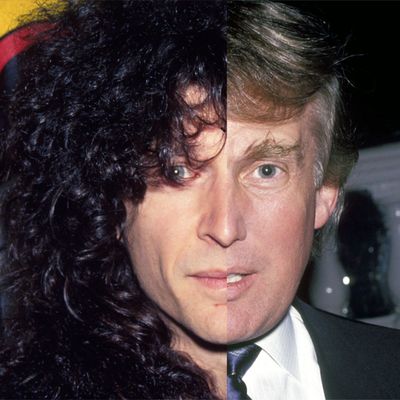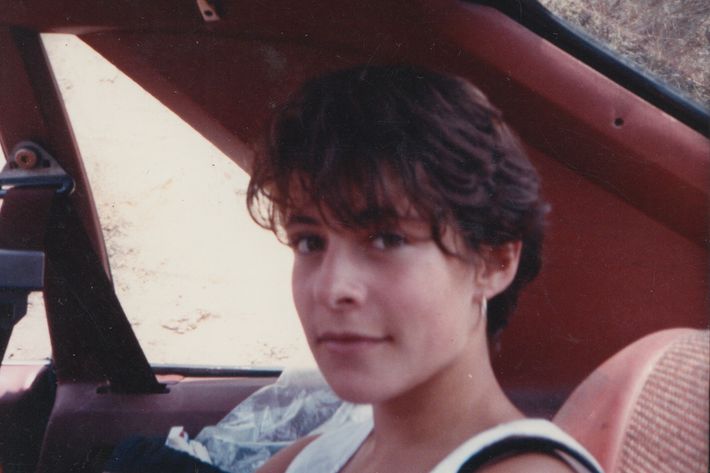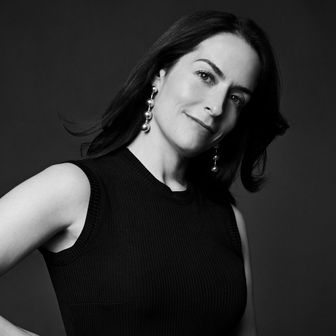
Los Angeles has millions of picture windows, and I spent the summer of 1991 making them so clean that birds could fly right into them and die. I had come from New York, with a pixie cut and a 15-year-old’s inflated sense of sophistication, to visit my dad, who was writing screenplays and doing odd jobs to pay the rent. On some mornings, before the sun was high, we would load up his ancient maroon Volvo with Windex and drive from Hollywood to Pasadena, where business was booming.
I didn’t enjoy washing windows, but I didn’t hate it either. I liked being with my dad, whom I never got to see during the school year. I liked watching him charm the old ladies who always asked if he was a struggling actor. Once the homeowners had left, we’d climb up the ladders and turn on “Howard,” as my dad called him. Always Howard.
I didn’t object. As a teenage girl, few things were more seductive to me than being let in on a world of male secrets. Listening to Howard Stern on the radio every morning felt like eavesdropping on the uncensored mind of the adolescent boy — a demographic I was desperate to understand.
“I’ll give her the hot beef injection,” Howard would joke about whichever woman he happened to be obsessing over. Hot beef injection. I turned that phrase around in my head endlessly as I removed streaks of Windex with a crumpled wad of newspaper.
Here he is talking with Stacy Galina from Knots Landing around that time:
Howard Stern: You ever bang a guy during a love-interest scene?
Stacy Galina: You mean really?
H.S.: Yeah.
S.G.: No.
H.S.: Yeah, does a guy ever get aroused? ‘Cause I know if I did a love [scene], there would be no room on the screen for my boner. They would have to throw me right out. Right, Robin?
Robin Quivers: That’s right.
H.S.: Robin knows, Robin just had her face. Never mind where her face was.
H.S.: But. Man, you are really cute.
S.G.: Let’s do it, Howard. I’m going to talk to the producers, ya know. It can be like an abusive kind of thing, where you like come in, you rough me up a little bit.
H.S.: Ya know what I do. I tie you to my radiator and stretch you.
S.G.: Cool. I love it.
H.S.: That would be so cool.[November 27, 1991]
Howard was new to Los Angeles that year, conquering a new market after having made a name for himself in New York. By this point, he had his schtick down pat. In his four hours on air each morning, he mixed a cocktail of interviews, rape jokes about his competition, fart gags, and riffs off the news. A recurring motif involved “Butt Bongo,” in which a member of his studio crew would spank a stripper to the beat of a song as Howard salivated in the background. (In 1992 he released an hour-long video called Butt Bongo Fiesta that sold more than 200,000 copies and made more than $10 million.) He often invited Playboy bunnies onto his show to endure sniveling inquiries about “lesbian” sex or graphic descriptions of how he’d imagined having sex with them. Disregarding the racially tense atmosphere — the Rodney King beating had just happened that March — Howard frequently managed to combine his racism and his misogyny into a single joke:
Howard Stern: The closest I came to making love to a black woman was, I masturbated to a picture of Aunt Jemima.
Geraldo Rivera: Oh, come on.
H.S.: On a pancake box. All right? … I did it right on her kerchief.
I’d like to say that this was shocking and foreign to me at the time, but everything he said reinforced subtle messages that had been making me queasy for years. Howard was like Alex, the guy in physics class who spread rumors about my gay friend when she refused to date him. He sounded like John, the guy who pressured me to “at least give him a blow job” after one bad date because I had “led him on.” He even bore a passing resemblance to one of the writers from the New York Times who noted that Patricia Bowman had “a little wild streak” while reporting about her rape by William Kennedy Smith in coverage of the trial I had followed closely that spring.
The fact that Howard was not a teenage boy but a grown, married man with daughters of his own and millions of listeners opened up a new and disturbing line of questioning for me. Was he the one man who would really say what so many men were actually thinking? Was my dad, a man I loved, a man who spoke kindly to old women and taught me about literature, capable of seeing the world that way, too?
Recently, I asked my dad why he allowed me to listen to Howard’s sexist rants when I was just a teenager. He had no good answer. I think maybe he wanted me to understand that, no matter what I did, there were people who would judge me by values I couldn’t control. I remember a conversation around that time in which he told me that every man looked at every woman and decided within 30 seconds whether he wanted to have sex with her. “Boys are stupid,” he often said, “every single one of them.” I guess my dad figured that if I knew that (heterosexual) men were always ranking me and every other woman they met on a fuckability scale of 1 to 10, I could outsmart them. But however well-intentioned, these messages distort my sense of reality still: Don’t become an un-fuckable woman or you will never have any power over men. But don’t become a too-fuckable woman or no one will take you seriously.

As a teenager, I tried to gauge where I fell on the scale with pretty much every male I encountered. I also tried hard to guard against becoming one of the “bimbos” Howard wanted to spank for fun. My jeans got baggier, my bad attitude got worse. I took to initiating almost every interaction with a man by insulting or challenging him in some way. It was a rudimentary test: I figured if a boy still liked me with my short hair and surly opinions then he was at least one step up from the Howards of the world.
Until Donald Trump decided to run for president, I hadn’t had much reason to think about Howard in the last 25 years. Occasionally, clips from America’s Got Talent would appear in my Facebook feed, and I’d see him making small children cry, his Long Island accent cutting through the computer speakers like a repressed memory. It was easy enough to write him off as a neutered holdover from a less enlightened time in the culture. Now, of course, Trump is dragging those repressed memories into the forefront of our collective consciousness. It’s not just what he said about women on Howard Stern’s show, it’s that the two men occupy such similar roles in the culture. Both Stern and Trump offer the enticing illusion of fearlessness, even as they capitalize on the fears of their audiences. They connect with their crowds by appearing off-the-cuff, unfiltered, and therefore authentic. They disdain political correctness, rules, and authority, and they give full voice to a misogyny that is designed to make a certain kind of man feel more powerful.
Trump: … But, okay, if your beautiful girl decided to leave you, she said, “Howard, I met another man.” And you now go into a major, major depression, you lose about 49 pounds. Now you’re starting to come out of the depression about two months later — you eventually have to come out, either do that or you’d just kill yourself — would you go out as your first date Marcia Cross?
Howard Stern: No.
Robin Quivers: Come on, just to start out?
D.T.: Would you go out with Marcia Cross, or would you turn gay, Howard?
H.S.: I’d go out with Marcia Cross. She’s got a good body; I’d just put a bag over her head.
[September 2005]
Stern has always fancied himself a daring, sexually liberated cultural commentator, fighting an ignoble battle against his many oppressors: the prude FCC, conservatives like Pat Buchanan, and liberal killjoys like Tipper Gore. By 1991 a serious panic over speech and power had begun. In January of that year, New York Magazine published the first article I’d ever seen on the topic of political correctness, with the requisite art of Nazi Youth burning a pile of books.
Here we are again, in a moment of national concern over the policing of speech, with Trump promising to make it safe once more to say “Merry Christmas.” It’s not just conservatives, though — plenty of people across the political spectrum fret about free speech. And political correctness has, in some cases, reached a new level of absurdity. But if there’s one good thing about p.c. culture it’s that it has raised a generation of women with higher standards for the messages that can and can’t be applied to them. These different expectations mean that people are far less tolerant of current-day Trump than they were of Howard when I was listening to him with my dad. There are women on Facebook signing up for their “woman card,” and highlight reels of Trump’s dumbest comments and protests at his rallies. If, instead of listening to Howard, I’d spent those mornings listening to the comedy and radio now made by women, I wouldn’t have given Howard’s (or my dad’s) opinions nearly as much weight.
Of course the seriousness of the response to Trump has to do with the fact that he is running for leader of the free world. Howard, despite a failed run for governor of New York in 1994, was always a comedian first and foremost. And like any good comedian — and even some bad ones — he held up a mirror to the culture. “The truth is funny because we all lie all day long,” he said to Rolling Stone in 1990. “We have to smile at the right time. We have to act like we care what other people say. We have to pretend we like our asshole boss. I lie too, but on the radio I say what I want.”
Howard wanted everybody to admit their fucked-up-ness, to say out loud what they said behind closed doors. He was repulsive, but by insisting on pulling back the blinds on himself and others, he might have helped destroy a certain kind of male privilege. He believed that his honesty about his own racism, sexism, and sexuality might at least make it crystal clear in more powerful people. He wasn’t entirely wrong; in the end, we have Howard to thank for capturing some of Trump’s rawest unapologetic objectification of women. And that is something I hope my own children never have to hear broadcast anywhere, least of all from the Oval Office.


